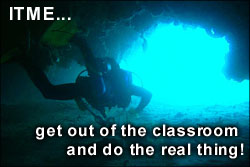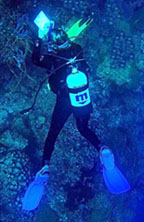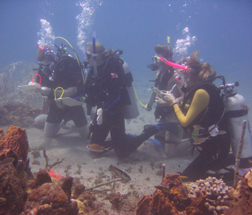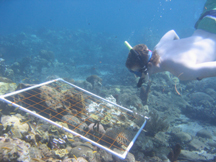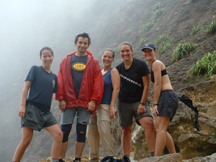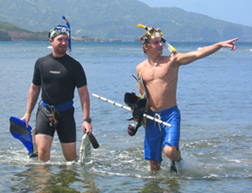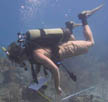|
|
|
COMPILED HISTORIC PAGES |
|
The
Academic Programs (2001-2008)
|
||
|
||
|
|
||
| Key Program Features | ||
|
||
| The ITME Semester Program (16 credits, 300 level) | ||
|
Academics
Applied to Research, Conservation & Outreach!
|
||
|
||
| Courses of the Semester Program | ||
|
• ITME AC302 Principles of Tropical Marine Ecology
(4 credit h) |
||
|
*
We spend 50% of the instruction time outdoors / in the sea. *
|
||
|
|
||
|
|
||
|
|
||
|
The
semester program was a demanding multidisciplinary hands-on experience,
during which students developed research skills and made their scientific
contribution to the understanding of marine ecosystems in Dominica
and beyond. For many, this program became a stepping stone towards
graduate school and a career in environmental sciences.
|
||
|
||
|
||
|
|
||
| The ITME Summer Program (5 credits, 300 level) | ||
|
Environmental
Learning Experiences Full of Adventure!
|
||
|
||
|
Courses of the Summer Program |
||
|
•
ITME AC305 Tropical Marine Ecology & Conservation (4
credit h) |
||
|
*
We spend 50% of the instruction time outdoors / in the sea. *
|
||
|
|
||




 |
||
|
|
||
|
The summer program provided a thorough exposure to marine ecology and conservation issues of the Caribbean, for students unable to leave their home institutions for an entire semester. Students traveled to and explored a variety of marine ecosystems around the island to complement classes and field laboratories. |
||
|
||
|
||
|
|
||
| Admission Criteria | ||
 |
||
|
General Requirements |
||
|
||
| We
are thus seeking curious, committed students with a thirst for learning,
and the maturity and personal initiative to work independently as
well as in a group. Participants should embrace the challenges of
working outdoors, be prepared to adapt to changing circumstances,
and make use of this unique educational opportunity. Applicants
should exhibit enthusiasm, compassion, flexibility, as well as a willingness
to put the needs of the group ahead of his/her own when necessary. Before completing your application for admission, carefully consider the fact that this experience will likely be very different from your academic experience to date. You will be working long hours, often feel physically and mentally drained from the field work and academic demands, and be expected to fully participate in all aspects of group-living at a biological field station. You will be further expected to adhere to the rules and regulations of student conduct presented during orientation. ALL STUDENTS MUST BE GOOD SWIMMERS AND DEMONSTRATE COMFORT IN THE MARINE ENVIRONMENT. SCUBA diving is not a requirement for the courses. If and when appropriate, SCUBA may be applied in field research. Students who want to have this option must be certified prior to attending the courses. Every student should bring his/her own snorkeling/diving gear. |
||
|
Academic
Requirements
|
||
|
||
|
Applications
from high school graduates who can demonstrate (transcripts) a strong
academic aptitude towards natural sciences will be considered for
admission to the Summer program only.
|
||
|
Every
application submitted to ITME (Admissions
Committee) must include:
|
||
|
||
| Courses & Topics | ||
 |
||
|
All
ITME courses are filled with interesting and adventurous excursions.
The unique marine habitats surrounding the island are our "visual aids". |
||
| Lecture and Laboratory Courses | ||
| Principles of Tropical Marine Ecology: ITME AC 302 (Semester) 4 credits | ||
| Principles
of Tropical Marine Ecology focuses on the community structure, nutrient
cycles, and energy flow of tropical marine ecosystems such as coral
reefs, sea grass beds, and mangrove forests. The physical and biological
oceanography of the greater Caribbean, principles of marine biology,
and systems ecology form the basis for a detailed account and comparison
of supra-, inter- and sub-tidal marine habitats. Field laboratories
and excursions will provide ample opportunities for students to examine
each of the marine ecosystems covered in this course, firsthand. Biological
productivity, food webs, population dynamics, pollution, and disturbance
(natural versus anthropogenic) are interpreted with reference to human
use of marine resources. Course meets for 3 hours of lecture and 3 hours of field labs each week. |
||
|
|
||
| Natural History & Identification of Marine Organisms: ITME AC 301 (Semester) 4 credits | ||
| Natural
History and Identification of Marine Organisms covers functional morphology,
behavior, and identification of organisms from tropical marine habitats.
Emphasis is placed on marine vascular plants, benthic and pelagic
inshore macro-fauna and flora. Some planktonic and interstitial microorganisms
will also be examined. Students apply basic methods/techniques of
field observation, data collection, and record keeping, in an inquiry-driven
approach to marine field-biology, specifically to habitat descriptions.
Course meets for 3 hours of lecture and 3 hours of field labs each week. |
||
|
|
||
|
Marine
Research Methodology & Practicum: ITME AC 303 (Semester) 4 credits
|
||
|
This course introduces students to project design, proposal writing,
sampling techniques, data collection, data analysis and scientific
writing. Students develop and carry out independent research projects
and participate in ongoing research in conjunction with their regular
course work. Course meets for 3 hours of lecture and 3 hours of field labs each week. |
||
|
|
||
| Marine Resource Conservation: ITME AC 304 (Semester) 4 credits | ||
|
Marine
Resource Conservation introduces the fundamental concepts in resource
management and socio-economics relevant to the conservation of natural
resources of the Caribbean. Emphasis is placed on issues peculiar
to small island nations. It addresses environmental policy issues
affecting the management of Dominica's marine resources. The course
also outlines opportunities for economic development based on marine
environments. |
||
|
|
||
|
Tropical
Marine Ecology & Conservation: ITME
AC 305 (Summer) 4
credits
|
||
| Tropical
Marine Ecology and Conservation analyzes the relationship between
marine ecology and resource management. The ecology of marine ecosystems
forms the foundation for an interdisciplinary examination of coastal
conservation issues in the Caribbean. Economic and social requirements
for environmental conservation will be introduced to the students,
who then outline potential conservation strategies. Extensive field
surveys provide students with an experiential approach to marine biology.
Organized interactions with people dependent on marine resources enhance
the student's exposure to issues of marine conservation. Course meets for 9 hours of lecture and 9 hours of field laboratory each week.. |
||
| Seminars | ||
|
Caribbean Issues Marine Resource Management: ITME AC 306 (Summer) 1 credit |
||
| Forum
for presentations and discussions led by staff, students, and guest
speakers. Offered in conjunction with AC 305, this course engages
students in identifying and analyzing key issues of environmental
conservation in Dominica. Backed by their field observations and laboratories,
student's write expository term papers on principle issue of marine
resource conservation of the island. Course meets for 6 hours of lecture each week. |
||
| Research Assistantships (Upon demand by faculty only!) | ||
| Volunteer Research Assistantship - Standard: ITME AC 201 | ||
|
ITME
offers a limited number of basic research assistantships
upon requests from staff scientists. These are volunteer positions,
and candidates must cover all transportation costs to and from Dominica,
as well as room and board services in Dominica. Requirements include
a minimum of 2 years of biological sciences and good water skills.
Specific requirements depend on the specific research assistantship. |
||
|
|
||
|
Volunteer Research Assistantship - Advanced: ITME AC 401 |
||
|
ITME offers a limited number of advanced research
assistantships upon requests from staff scientists. These are
volunteer positions and candidates must cover all transportation
costs to and from Dominica. However, 50 - 100 % of the room and
board services in Dominica will be covered by ITME. Requirements
include an undergraduate degree in biological sciences, good water
skills, computer skills, and field research experience. Specific
requirements depend on the specific research assistantship. |
||
| Faculty & Staff | ||
| Marine Biology/Ecology, Natural History of Marine Organisms | ||
| Dr. Sascha C.C. Steiner | ||
|
Resident Faculty - Marine Biologist - Chief Executive Officer of ITME |
||
| Dr. Steiner has been working in the greater Caribbean region since 1984. His research has so far focused on the reproduction and systematics of reef corals, coral reef community structure, and various aspects of coral reef monitoring including the assessments of bleaching episodes, diseases, D. antillarum and algal cover. Dr. Steiner has taught graduate and undergraduate courses at universities around the world. In 1999 he founded the Institute for Tropical Marine Ecology (ITME) in Dominica and he has served as its CEO since then. Dr. Steiner teaches Marine Ecology and lectures in other courses. | ||
| In 2001 Dr. Steiner was appointed to serve on the Dominica's National Climate Change Committee by Dominica's Minister of Agriculture. Since then he has assumed positions in many other government sponsored initiatives and NGOs | ||
| Dr. Jill L. Borger | ||
|
Visiting Adjunct Faculty - Marine Biologist |
||
|
Dr. Borger is an expert on coral diseases and is currently monitoring disease manifestations and distribution in Dominica and the Florida Keys, but her work has also brought her to the Turks and Caicos Islands and Panama. She teaches Natural History and Identification of Marine Organisms. Dr. Borger has recently also started working with dophins, has lauched FINSEA.ORG, and teaches at the University of Miami. |
||
| Dr. Stacey M. Williams | ||
|
Visiting Adjunct Faculty, Program Coordinator |
||
| Ms. Williams completed the ITME Fall Program in 2001, and earned her Bachelor's degree in Science from Spring Hill College (AL, USA) in 2002. During her time at ITME, she focused her research on the quantification of the sea urchin D. antillarum. She then continued studying sea urchins in the Gulf of Mexico, and more recently at the Darling Marine Center in Maine. Stacey returned to ITME to teach Natural History of Marine Organisms, and coordinate field laboratories as well as the logistics of field operations during the Fall 2002. In the Spring of 2003 she held a Research Assistantship at ITME. After teaching the Summer and Fall terms in 2003, Stacey served as Program Coordinator. | ||
|
Dr. Demian A. Willette |
||
| Visiting Adjunct Faculty, Student Projects Coordinator, Lecturer, Field Instructor. | ||
|
Mr. Willette completed the ITME Fall program in 2001. As Founder and President of the Marine Biology Club at Iowa State University , Ames, he has been involved in many exciting projects in the US and the Caribbean. After graduating from Iowa State U in Spring 2003, he returned to ITME to teach Natural History of Marine Organisms. |
||
|
Kim L. McDonald |
||
| Interim Field Station Director, Lecturer, Field Instructor. | ||
|
After completing the semester program at ITME in 2003, Ms. McDonald graduated from her home institution, University of Washington. Kim brought with her a variety of field experiences, such as working on oil tankers / drilling platforms and in fisheries research, which made her an perfect addition to the ITME staff. Ms. McDonald lectures in Organism Biology and Ecology, and is currently coordinating all field operations during the academic programs. After serving as Program Coordinator during 20004 and 2005, she assumed the Director's position at the field station. |
||
| Teaching and Research Assistants | ||
|
Lori Price (Fall 2008) |
||
| Teaching/Research Assistant, Lecturer, Field Instructor. | ||
| Lori was part of the 2007 Fall Research Team during which large-scale habitat mapping was carried out throughout Dominica's coastal waters. She is a graduate of Messiah College and has research experience in algal blooms (VIMS, VI) and ichthyoplankton (Dauphin Island AL) | ||
|
Keira Macfarlane (Fall 2008) |
||
| Teaching/Research Assistant, Lecturer, Field Instructor. | ||
| Keira was also a member of the Fall 2007 Research Team. She grdauted from the University of Western Ontario. | ||
| Resource Conservation, Resource Use in Dominica | ||
| Dr. Lennox Honychurch | ||
|
Resident Adjunct Faculty - Anthropologist |
||
|
Dr. Honychurch has written definitive texts on the history of Dominica and its peoples. His publications are based on many years of archeological, anthropological, as well as biological research. While continuing to explore the origins and the development of Dominican cultures and the utilization of natural resources, Dr. Honeychurch is deeply committed to his birthplace. He has served as a member of the House of Assembly from 1975-1979 and was involved in negotiations for the island's independence in 1978. Dr. Honychurch is the principal lecturer in Resource Conservation and also holds a post at the University of the West Indies' campus in Dominica. |
||
| Resource Conservation - Lecturers | ||
|
Dr.
David Lang |
||
| Harold
Guiste Chief Fisheries Officer, Ministry of Agriculture & Environment, Gov. of Dominica. |
||
| Algernon
Philbert Senior Fisheries Officer, Ministry of Agriculture & Environment, Gov. of Dominica. |
||
| Norman
Norris Fisheries Officer, Ministry of Agriculture & Environment, Gov. of Dominica. |
||
| Arlington
James Forestry Officer, Ministry of Agriculture & Environment, Gov. of Dominica |
||
| Raphael
Joseph Chief Environmental Health Officer, Ministry of Health, Gov. of Dominica |
||
| John
Robin Founder and CEO of Benjo's Seamoss and Agroprocessing |
||
| Terry
Raymond Coordinator Youth Environmental Service Corps, Ministry of Education, Gov. of Dominica |
||
| John
Kirby Horticulturist - JK Enterprises, Castelton Estate |
||
| Nancy
Osler MS Plant Ecologist, Resident Scientist ARTEC, Springfield |
||
| Board of Academic Advisors | ||
|
Dr.
A. Antonius, University of Vienna, Austria. |
||
| Admissions and Student Affairs (NEW YORK OFFICE, USA) | ||
|
Mary L. Akers |
||
| Director of Admissions and Student Affairs | ||
| Mrs. Akers has worked in the field of counseling and administration since 1990. Before joining ITME in 1998, she held positions in the Florida Keys, Hawaii, and the Turks and Caicos Islands. She worked as Field Associate for The Center for Marine Resource Studies, TCI, and managed a fly/dive charter business in Honolulu. Mrs. Akers is the first contact for most ITME applicants. Based at the Institute's USA Office (NY), she guides students and visiting researchers through the application and enrollment process. When ever possible, Mrs. Akers resides on site during the programs and serves as student liaison. | ||
| Site Operations | ||
|
Chrystel J. Steiner |
||
| Room and Board | ||
| Mrs. Steiner coordinates the day-to-day supplies-chain for ITME's room and board services provided to program participants, researchers and visiting university groups. | ||
| Margaret-Rose Dafoe - Meal Services/ Housekeeping | ||
| Cecelia Henry - Meal Services | ||
| Mornel Allan -Meal Services | ||
| Bennett Senhouse - Transportation | ||
| Norman Timpthy - Physical Plant | ||
| Vessel Based Marine Operations | ||
|
Harald Zahn and Beatrice Cantera |
||
| SCUBA Diving & Boat Operations | ||
| Mr. Zahn and Mrs. Cantera are the owners and operators of the East Carib Dive Center (ECDC). ITME has established a close relationship with the Center. Most of ITME's vessel-based excursions and field labs are facilitated in collaboration with ECDC. Harald and Beatrice worked in the Maldives and Red Sea for several years before moving to Dominica. | ||
| Earning Credit | ||
|
Upon
successful completion of the program you will receive:
|
||
ITME is a private, tertiary level, research/education institution, registered by the Government of the the Commonwealth of Dominica. While some universities and colleges accept ITME's official transcripts, others have alliterative mechanisms that allow students to obtain credit for study-abroad programs, especially intensive applied biology courses. These are often called "independent study" courses. If you are going to take the courses for credit, you must arrange this through your professor or academic advisor and university. We recommend you do this prior to coming to Dominica. Students that have taken the ITME courses for credit came from a variety of geographic regions including: |
||
|
||
